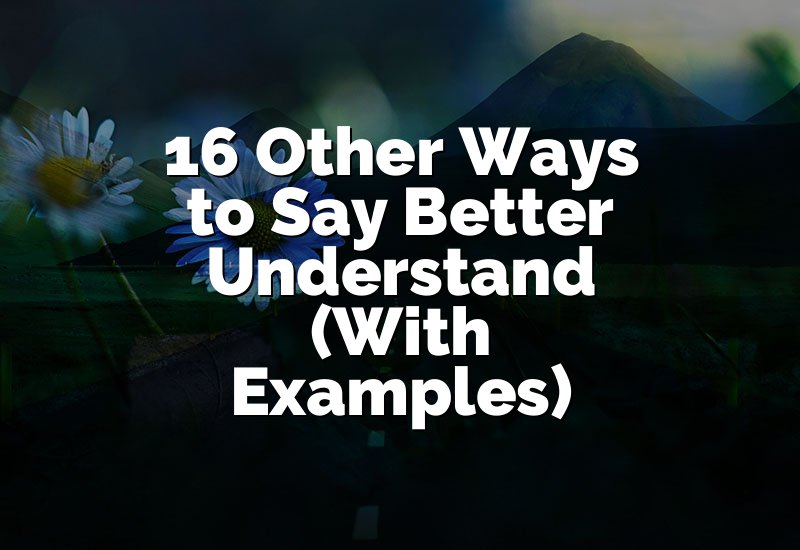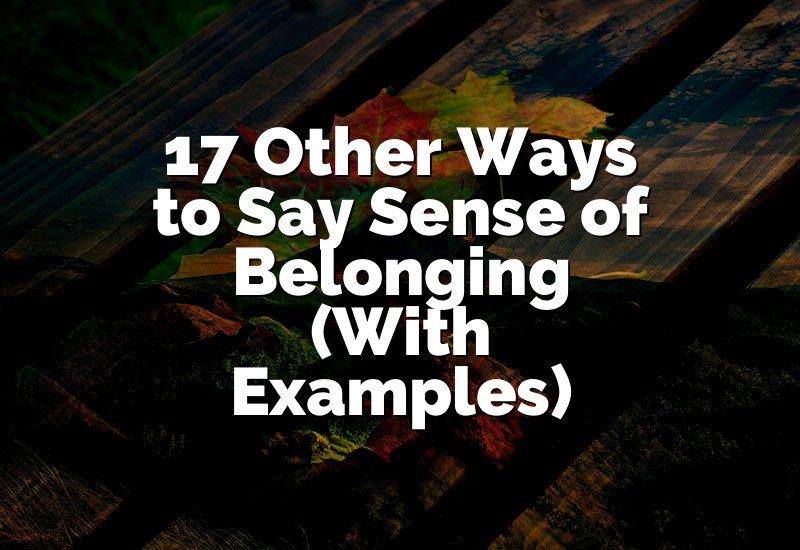When it comes to communication, especially in conversations with people you don't know well, asking questions politely is key. It shows respect, consideration, and a genuine interest in the other person's thoughts or feelings. One phrase often used to ask questions in a polite way is "If you don't mind me asking."
While this is certainly polite, there are many other alternatives that can sound even more refined, considerate, or professional. In this article, we'll explore alternatives that sound equally respectful and provide a wider range of options depending on the tone or context of the conversation.
28 Polite Alternatives to “If You Don't Mind Me Asking”
Politeness is an essential part of communication, but the way you ask questions can either open doors or make others feel uncomfortable. Using polite alternatives to "If you don't mind me asking" allows you to sound more respectful, flexible, and adaptable. Let's break down some effective alternatives and how they can fit into different types of conversations.
1. May I ask…
This is a classic alternative that works in both formal and informal settings. The phrase "May I ask…" sounds respectful and is perfect for when you want to come across as considerate. It's neutral enough for professional situations while still maintaining a friendly tone.
For example:
- May I ask what time your meeting starts?
- May I ask how long you’ve been working in this industry?
2. I hope you don’t mind me asking, but…
This phrase softens your inquiry and signals that you are aware of the other person's potential discomfort. It gives the person you’re speaking with the option to decline without feeling put on the spot.
For example:
- I hope you don’t mind me asking, but could you explain how the process works?
- I hope you don’t mind me asking, but how did you manage that situation?
3. Would you mind if I ask…
This version is polite and allows the other person to provide their consent before you proceed with your question. It makes it clear that you are giving them the choice to refuse.
For example:
- Would you mind if I ask about your travel experience?
- Would you mind if I ask why you chose this particular project?

4. If it’s okay with you, could I ask…
This alternative gives the person an opportunity to decline upfront, giving them the space they need to feel comfortable. It’s great for sensitive or private topics.
For example:
- If it's okay with you, could I ask why you decided to relocate?
- If it's okay with you, could I ask about your thoughts on the recent changes?
5. I hope it’s not too much trouble, but…
This phrase acknowledges the possibility that your question could be inconvenient and offers an out. It shows that you’re being thoughtful about their time and comfort level.
For example:
- I hope it's not too much trouble, but could you explain the procedure to me?
- I hope it's not too much trouble, but would you mind sharing how you got started in your field?
See Also: 21 Other Ways to Say "I'm Proud of You"
6. Would it be alright if I ask…
Similar to "Would you mind if I ask," this phrase is another polite way to check whether the person is comfortable answering your question. It's an especially good option for conversations that might touch on sensitive matters.
For example:
- Would it be alright if I ask how you handled that challenge at work?
- Would it be alright if I ask how you stay motivated during difficult times?
7. If you don’t mind sharing…
This version is a great alternative for when you’re requesting something that might feel personal or sensitive. It's polite, yet allows the other person to decide whether or not they want to open up.
For example:
- If you don't mind sharing, could you tell me about your experience with this product?
- If you don't mind sharing, how did you manage to overcome that obstacle?
8. Can I ask you about…
This is a simple and direct way to introduce a question. It's casual and works well for informal conversations while still showing that you’re being polite.
For example:
- Can I ask you about your plans for the weekend?
- Can I ask you about your background in graphic design?
9. I hope this isn’t too forward, but…
If you're about to ask something that could be a little too personal or unexpected, this phrase signals that you’re aware of the boundaries and don't want to make the person uncomfortable.
For example:
- I hope this isn't too forward, but can you tell me how you achieved such success in your career?
- I hope this isn't too forward, but may I ask about your relationship with your co-workers?
10. Do you mind if I ask…
This is another polite alternative to "If you don't mind me asking," and it is slightly more direct while still giving the other person the chance to refuse.
For example:
- Do you mind if I ask how you ended up in this profession?
- Do you mind if I ask about your personal experience with this service?
11. If it’s not too personal, may I ask…
This phrase is particularly useful when you're aware that the topic you’re about to bring up could be sensitive. It shows respect for the person's privacy and gives them the option to decline.
For example:
- If it’s not too personal, may I ask how you stay organized at work?
- If it’s not too personal, may I ask why you chose to study abroad?
12. I don’t want to intrude, but could I ask…
This shows you're being mindful of the other person's comfort zone. It's ideal for when you're asking something that might feel like an intrusion.
For example:
- I don't want to intrude, but could I ask what your secret to success is?
- I don't want to intrude, but could you share your thoughts on the new policy?
13. Would it be alright to ask…
This polite phrasing is a formal way to introduce a question. It can be used in business or professional settings, where you want to ensure that your inquiry doesn't cross any boundaries.
For example:
- Would it be alright to ask about your team's strategy for growth?
- Would it be alright to ask how you got started in this field?
14. If you’re comfortable with it, may I ask…
This phrase is perfect when you’re speaking with someone you don't know well and you want to make sure they feel comfortable discussing something personal or private.
For example:
- If you're comfortable with it, may I ask how long you've been working in this industry?
- If you're comfortable with it, may I ask what motivated you to move to this city?
15. Do you mind telling me…
This version is straightforward and can work well in situations where you're inquiring about someone's opinion or perspective. It's slightly more casual than other alternatives.
For example:
- Do you mind telling me how you managed to finish the project so quickly?
- Do you mind telling me how you prepare for big presentations?
See Also: 21 Other Ways to Say "Hope All is Well"
16. If you wouldn’t mind, could I ask…
This is another polite option that provides the person with the ability to opt-out. It works well when asking for help or seeking advice.
For example:
- If you wouldn't mind, could I ask for your advice on this matter?
- If you wouldn't mind, could I ask about your thoughts on the recent changes?
17. If it’s not too much to ask…
This version is gentle and signals that you recognize that the request might require effort or thought from the other person.
For example:
- If it’s not too much to ask, could you share how you've been able to stay so organized?
- If it’s not too much to ask, would you mind telling me what inspired your recent project?
18. If it’s okay, can I ask…
This option is casual and suitable for informal settings. It gives the other person an easy out without making them feel uncomfortable.
For example:
- If it's okay, can I ask what motivated you to start your business?
- If it's okay, can I ask about your thoughts on the new software?
19. Would it be okay if I ask…
This phrase is another polite, slightly formal version that helps you sound considerate without being overly intrusive.
For example:
- Would it be okay if I ask about your past experiences in this field?
- Would it be okay if I ask for your opinion on this matter?
20. Is it alright if I ask…
This is a direct yet polite approach. It's appropriate for both formal and casual conversations, depending on your tone and the nature of the relationship.
For example:
- Is it alright if I ask how you stay motivated at work?
- Is it alright if I ask how you balance work and life?
21. Can I inquire about…
This is a more formal option for professional situations. It's respectful and indicates that you are seeking information rather than simply asking a casual question.
For example:
- Can I inquire about your experience with this new software?
- Can I inquire about the steps involved in your decision-making process?
22. I don't mean to be nosy, but…
This phrase is a great way to introduce a question that could potentially come across as invasive. It shows that you're aware of the sensitivity of the inquiry.
For example:
- I don't mean to be nosy, but how do you stay so focused throughout the day?
- I don't mean to be nosy, but what's your process for achieving work-life balance?
23. If it's not a bother, could I ask…
This alternative is another polite way to preface a question. It conveys consideration for the other person's time and space.
For example:
- If it's not a bother, could I ask how you managed that tough situation?
- If it's not a bother, could I ask about your favorite part of your job?
24. If it’s not too much of an inconvenience, could I ask…
This one works well when you want to ask for help or clarification without seeming demanding. It shows you understand their time is valuable.
For example:
- If it's not too much of an inconvenience, could I ask for your feedback on my proposal?
- If it's not too much of an inconvenience, could you explain the next steps?
25. Would you be willing to share…
This phrase is great for when you want to learn more about someone’s experiences or opinions, especially when you’re asking for something personal or detailed.
For example:
- Would you be willing to share your experience with the new system?
- Would you be willing to share how you approach creative projects?
See Also: 23 Other Ways to Say "Have a Great Rest of Your Week"
26. Could I ask you something, if it's alright…
This is a soft way to ask for permission to ask a question. It's polite, clear, and direct while still providing the other person the chance to decline.
For example:
- Could I ask you something, if it's alright? I'm curious about your approach to marketing.
- Could I ask you something, if it's alright? I'd love to know more about your recent travels.
27. I hope this isn't an imposition, but…
This phrase signals that you're aware your request might be asking a lot, so you're making it clear that you don't want to put pressure on the person you're speaking with.
For example:
- I hope this isn't an imposition, but could I ask how you achieved such impressive results?
- I hope this isn't an imposition, but would you mind sharing your strategy for this project?
28. Would you mind answering a question…
This is a direct yet polite alternative that can be used when you need to ask someone something without being too pushy. It offers the person a chance to refuse if necessary.
For example:
- Would you mind answering a question about your recent article?
- Would you mind answering a question about your past experience with this product?

Frequently Asked Questions
Is it rude to ask questions without prefacing them with a polite phrase?
Asking questions without using a polite phrase can come across as abrupt or impolite. It's generally a good idea to soften your questions with a polite introduction to make the other person feel respected and valued.
Can I use these alternatives in a job interview?
Yes, these alternatives are perfect for job interviews. They help you ask questions politely while maintaining professionalism and showing that you are considerate of the interviewer’s time and comfort.
Do I need to use polite phrases if I’m speaking with close friends?
While friends may not require the same level of formality, using polite phrases can still enhance the conversation and show respect, especially if the topic is sensitive.
Is it okay to use “I hope this isn’t too forward” in every conversation?
“I hope this isn’t too forward” is great for sensitive topics but may not be necessary in casual conversations. Use it when you’re asking something that could be seen as intrusive.
Can these alternatives be used in emails?
Yes, these alternatives are excellent for emails, particularly in professional settings, where you want to come across as polite and thoughtful.
Do I have to worry about tone when using these alternatives?
Yes, tone matters a lot! Make sure your tone matches the level of politeness in your phrasing. In more formal settings, a more neutral tone works best, while a friendlier tone can be used in casual settings.
Is it better to ask for permission to ask a question?
In certain situations, especially when discussing personal or sensitive topics, asking for permission is better. It shows respect and allows the person to feel more comfortable with your inquiry.
Can I switch up these phrases based on my relationship with the person?
Absolutely! Feel free to adjust the level of politeness based on your relationship with the person. For example, with close friends, you can be more casual, while in professional settings, a more formal tone might be appropriate.
I hope this article helped you find some great alternatives to “If you don't mind me asking.” By incorporating these polite phrases into your conversations, you'll come across as more thoughtful and considerate. Whether you're speaking with a colleague, a friend, or a stranger, these phrases offer a way to ask questions without sounding pushy or intrusive.









